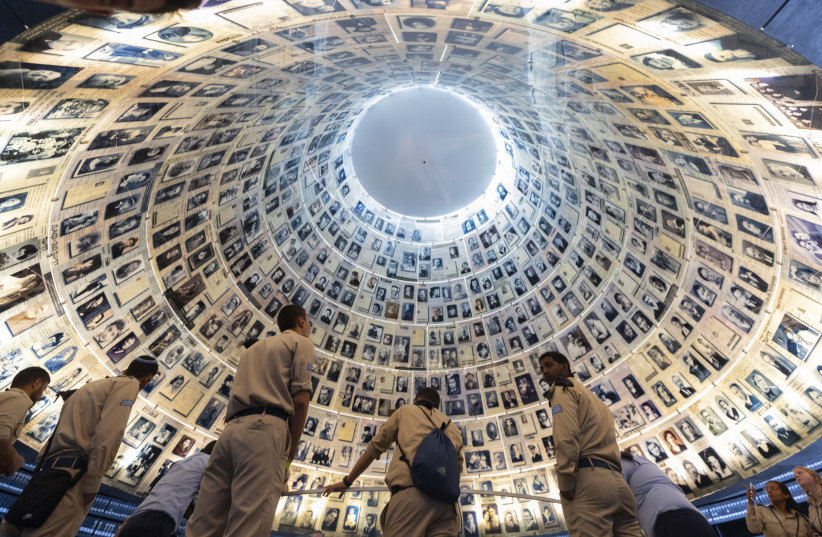As the world marks International Holocaust Remembrance Day, we are prompted to remember one of the most heinous atrocities in human history – the brutal murder of six million European Jews by the Nazi regime. It is always a humbling experience to reflect on the unimaginable pain of our forebearers, as well as their spirit and resilience to overcome and persevere.
This week, I had the honor to commemorate this somber occasion by participating in a hearing hosted by the Knesset’s Committee for Immigration, Absorption and Diaspora Affairs that took place at Yad Vashem, the world-renowned museum and memorial dedicated to the victims of the Holocaust.
Almost eight decades after the liberation of the camps, the last survivors of the Holocaust are passing away. It is our duty to ensure their stories are honored and never forgotten. Only by learning from the past can we understand what causes horrors such as these, to ensure that they are never again repeated in the future. Museums such as Yad Vashem and the US Holocaust Memorial Museum in Washington, DC, among others, ensure the memory of the Shoah will live on.
The design of the hall at Yad Vashem, in particular, reminds us of the nightmare of the Holocaust, but also the possibility and hope for the future. In that stunning building, we walk through the valley of the shadow of death, passing from the darkness of the Holocaust into the light, overlooking the Jerusalem woods.
The pathway evokes the wisdom of Rabbi Nachman of Breslov – that the whole world is a narrow bridge, but we must not be afraid. We are not afraid today. We are not afraid to live out our Judaism, whether in Israel or America or elsewhere. We are not afraid to call out antisemitism wherever we see it, including when it masquerades as a critique of the State of Israel. When we say, “Never Again,” we mean it. No one – not Hamas in the Gaza Strip, nor ignorant and antagonistic social media stars, or for that matter, any of their allies – will intimidate us.

International Holocaust Remembrance Day: Reinforcing "Never Again"
THE HOLOCAUST continues to impose a heavy responsibility on both American Jews and the State of Israel. We have a duty to ensure that the remaining survivors can live out their days in dignity. We also must continue to support restitution efforts, as seen in the work of the Claims Conference and other organizations.
Attempts at reclamation are not over. Just last week, members of the Mendelssohn-Bartholdy family filed a suit to recover Van Gogh’s Sunflowers painting, looted from their forebears. It is never too late for justice to be done.
We are now pivoting to a new era, in which our obligation and focus must shift to education and awareness. In the US the Conference of Presidents of Major American Jewish Organizations advocates for Holocaust education to be enshrined into school curricula for children and university students. Along with our member organizations, we also work to advance anti-bias training, which includes intensive education about antisemitism.
Amid a rise in antisemitic hate crimes in the US, this work is even more urgent. We successfully focus on these endeavors in a number of ways, but perhaps most tangibly in the widespread adoption of the International Holocaust Remembrance Alliance’s working definition of antisemitism.
Our efforts encouraged 28 states to adopt the IHRA definition and contributed to the Biden administration’s recent reaffirmation of the IHRA definition. More than a thousand non-governmental organizations have adopted the definition as well. The IHRA definition acknowledges the link between delegitimization efforts aimed at Israel and actual antisemitism – and is a vital tool in our fight against Jew-hatred.
International Holocaust Remembrance Day is not just about terror and genocide. It is also a testament to our commitment to the words “Never Again.” In that way, this hallowed day contains within it a balance: We memorialize the history of the past in order to imagine a better future.
No matter the odds, we the Jewish people always have the ability to fight back against those who would do us harm. The Warsaw Ghetto Uprising is remembered as one of the inspiring, hopeful moments of the Holocaust, if there can be such a thing. It reminds us not to be complacent in the face of rising antisemitism.
So, in 2023, we know that we must do more than remember. We must also recommit ourselves to educating future generations and securing the future of the State of Israel and the Jewish people.
The writer is the chief executive officer of the Conference of Presidents of Major American Jewish Organizations. In that capacity, he is the senior professional guiding the Conference’s agenda on behalf of the 53 national member organizations, which represent the wide mosaic of American Jewish life. Follow him at @Daroff
